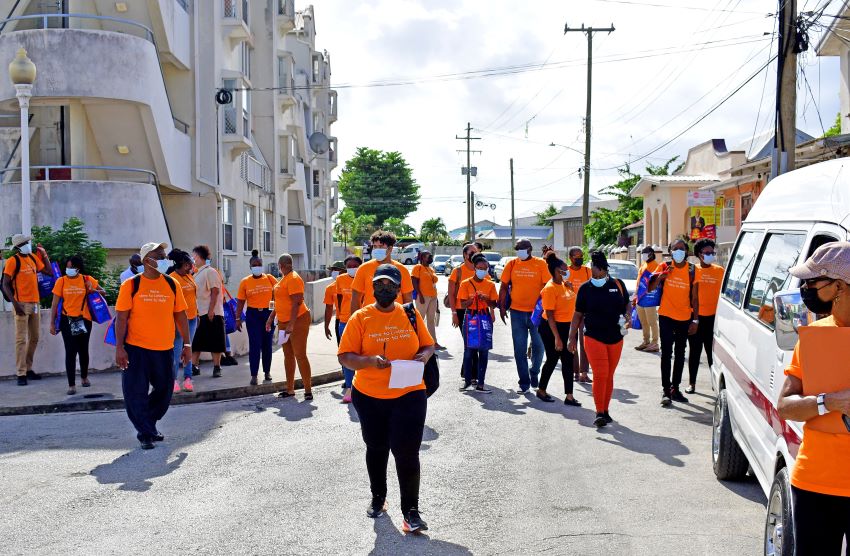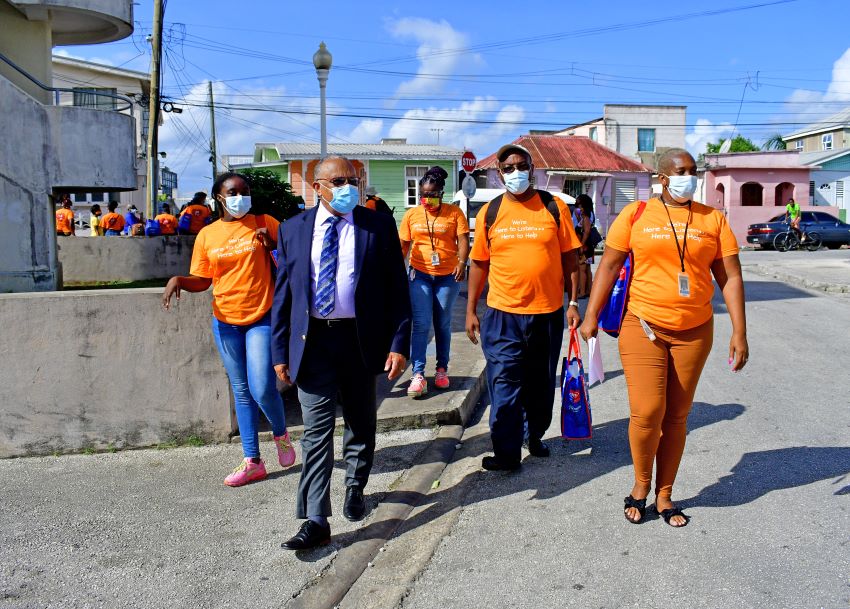
Wellington Street, The City, was the first stop today as the Ministry of Health and Wellness embarked on an exercise, as part of its Mission Critical: Saving Lives Risk Communication and Community Engagement response to the COVID-19 epidemic.
Lead Coordinator of the community initiative and Centers for Disease Control and Prevention (CDC) Consultant, Arlene Husbands, emphasised the importance of the exercise saying the team was trying to understand what are some of people’s COVID-19 fears and concerns.
“We want to know how we can help them to cope, recognising that some persons who have been affected may have to live with it long term. Some do not understand that discrimination is not helpful. We want to help persons to get a better understanding of how to manage this disease using the basic protocols,” she said.
Ms. Husbands continued: “We are looking to do messaging using the information obtained from the community members rather than creating messages for them, and also pull other agencies on board from the public and private sectors, as we already have the assistance from some non-health agencies. We hope to eventually see the attitudes of Barbadians changing as a result of informed responses by the Ministry of Health and Wellness.”
Acting Minister of Health and Wellness, Senator Dr. Jerome Walcott, who joined the team before they moved through the district, lauded the Community Engagement Project and expressed concern about the increase in cases.
“The rising numbers has been a great concern particularly to us in the health sector. We have seen the median age of persons infected with COVID-19 drop to 38 in the last few weeks and the median age of persons dying being 65. I see the initiative as giving and gathering information, to be used to create our messaging for the target audiences.
“We need to find out how people feel about COVID-19, what are the experiences of persons who had COVID-19, and how persons feel about the vaccine. It is important to target our elderly persons and our young persons. We also need to target bars and rum shops,” he stressed.
US CDC and Control Point of Contact, Caribbean Regional Office, Giselle Guavera, said the engagement project is very important, and one that she would like to see replicated throughout the wider Caribbean.
“The misinformation and vaccine hesitance is widespread throughout the region. We hope to get rid of the stigma of COVID-19 and see more people feeling comfortable that they can share information and reach out for information to help reduce their risk,” she noted.
Pamala Murray, a representative from McBride Caribbean, one of the sponsors of the project, said the company “is pleased to partner with the Ministry of Health and Wellness to achieve the mission critical goal of saving lives in Barbados” and helping persons to cope with COVID-19.

McBride has provided the Ministry with Beep liquid hand sanitiser and disinfectant spray for distribution in communities to persons who participate in the short survey.
Also part of the group at Wellington Street were Community Health Liaison Officers, Aryah Nicholls-Ashby and Ricky Edwards, who have been working with the COVID Monitoring Unit for over a year.
They shared that they have seen the attitudes of persons to COVID-19 in Barbados, and some of the negative behaviours displayed. These include persons liming and drinking alcohol, and not complying with the mask wearing and physical distancing protocols.
They added, however, that they sometimes receive a positive response as they intervene, but on other occasions, persons can be abusive.
The community mobilisation initiative will focus on identifying the needs of communities affected by COVID-19, strengthening community action towards improved health behaviours, and creating collective responsibility for population health and well-being.
Teams wearing easily identifiable orange T-shirts, with the slogan “We’re here to listen … here to help”, will visit communities from Friday to Sunday, between 10:00 a.m. and 4:00 p.m., and will operate in accordance with the COVID-19 protocols. All data collected will be kept confidential.
Members of the public are encouraged to fully cooperate as the information collected will assist in informing future COVID-19 response activities.
